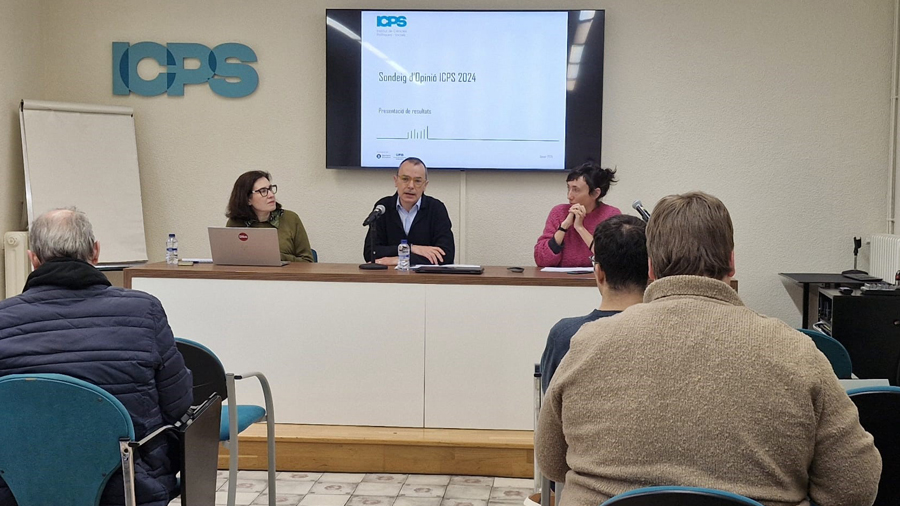59% of Catalan voters believe democracy is being threatened
The annual poll conducted by the Institute of Political and Social Sciences, the UAB Consortium and the Barcelona Provincial Council indicate concern for the health of democracy among Catalan voters, and a conservative trend among young men. The under 25 group is the one most situated at the right of the political spectrum.

The 2024 public opinion poll, the 25th in the uninterrupted series of polls since 1989 conducted by the Institute of Political and Social Sciences (ICPS), dedicated a series of questions focusing on the state of democracy. The main results indicate that 59% of voters believe democracy to be under threat. Fake news (83.7%), far-right parties (81.7%) and economic inequalities (79.2%) are seen as the main threats to democracy.
In contrast, the economic situation, inflation and rise in prices are considered to be the main threats to maintaing their way of life for 20.6% of those polled, followed by the political situation (14.1%), public insecurity (8.1%), unemployment and precarious work conditions (7%), and access to affordable housing (5.9%).
Democracy continues to be the preferred political system (81.6%), although this preference is significantly lower amongst those under 25, particularly amongst men (61.8%), of which 16% say they prefer an authoritarian regime. In this group, only 29% consider it extremely important to live in a democracy. However, 85% do not agree with the phrase "Democracy is not useful to solve problems".
Gender gap amongst the youngest pollers
As already seen in the 2023 poll, this year there is again a conservative drift amongst men under 25. This group is the one located most to the right of the political spectrum, and differs significantly from the opinion of same-aged women. A total of 30% of men in this age range consider themselves to be politically right-wing, while in the case of women the percentage is less than 10%.
The youngest men also reveal more conservative trends in other areas, such as agreeing with feminism. In 2023, a total of 57.7% of those under 25 agreed with feminism, but one year later this figure is now 40%, a fall of almost 18 points.
Opinion on immigration worsens in comparison to 2023
According to the poll, opinions on immigration have worsened when compared to 2023, probably because the large amount of public debate in that area. Nevertheless, opinions are more favourable than they were twenty or thirty years ago.
Those who agreed with this social phenomenon passed from 59.7% in 2023 to 53.9% in 2024, while those disagreeing with immigration rose from 21.7% to 28.1%. There was also a rise in the amount of pollers considering the need to limit immigration, from 44.4% to 54.1%.
According to sex and age, men under 25 are those most against immigration (38%), and women under 35, those most in favour of immigration (71%).
When divided into political parties with representation within the Parliament of Catalonia, 100% of voters of the political party Aliança Catalana agree to limiting the entrance of immigrants, followed by voters of Vox (85.7%), Junts (67.4%), PP (64.9%), PSC (50.2%), ERC (43.2%), En Comú Podem (20.6%), and CUP (17.2%). One aspect worth highlighting is that the negative opinions on immigration skyrocket among voters of the political party Junts (rising 19.1 points vs 2023).
Decrease in political tension
The 2024 public opinion poll reveals that feelings toward politics are increasingly negative. The feeling of mistrust has grown in the past years (28% of those polled in 2024), frustration (25.3%) and irritation (12.2%).
In addition, there is less interest in politics and fewer discussions on the topic when compared to the period of Catalonia independence movement. Also worth highlighting, as a stable trend, is the existence of a gender gap between those interested in politics (men are 10 points above women in terms of interest in politics).
The poll also served to reveal that, for the first time since 2011, there is a tie between those in favour of independence (31.3% of those polled) or remaining an Autonomous Community (30.6%). There is a 20 point difference between continuing to form part of Spain (56.7% in favour and 36.7% in favour of a Catalan state). The importance of the topic falls as well.
Less than 5% of those polled believe that the movement will end in independence for Catalonia. Since 2018 this topic has fallen 16 points among voters of Junts, 24 among voters of ERC and 29 among voters of CUP. Nevertheless, the majority of people believe the movement has not ended yet.
This change in opinion in Catalonia projects a preference for Salvador Illa (PSC) as president, with a rise in 9 points when compared to 2023 (from 11.7 % to 20.6%). The pollers place Carles Puigdemont (Junts) as second option, with a loss of 2.2 points (from 16.7% to 14.5%), and as third option, Oriol Junqueras (ERC), who also falls 2.1 points (from 12.8% to 10.7%).
Amongst PSC voters, the preference for Illa increases 20 points with respect to 2023 (from 42% to 61.1%), while Puigdemont is the one who shows the greatest preference among his voters (74.1%).
In order to conduct the ICPS 2024 Public Opinion Poll of Catalonia, 1,200 personal home interviews were carried out with the population aged 18 years or older, of Spanish nationality and registered in the municipality where the interview was made. The fieldwork, carried out by the company GESOP, took place from 7 November to 3 December 2024.
ICPS 2024 Public Opinion Poll (in Catalan)
The UAB, with Sustainable Development Goals
Reduced inequalities